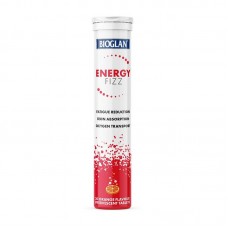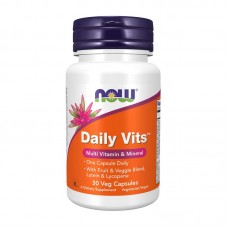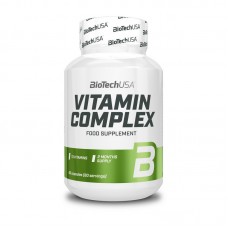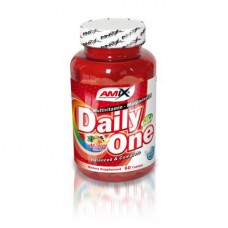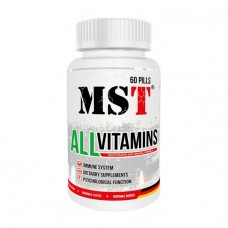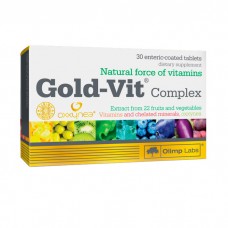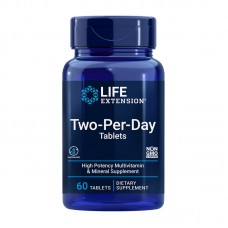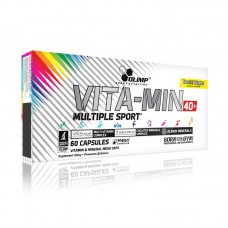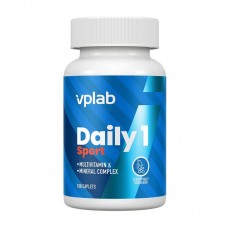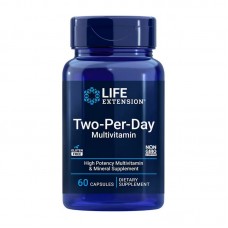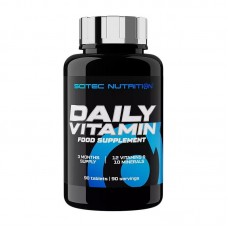Price: 0 uah
CheckoutVitamin and Mineral Complexes
Vitamin complexes are combinations of vitamins and minerals concentrated in one tablet to help restore strength and good health. As we know, a healthy balanced diet, active lifestyle, and stress-free environment are important elements necessary for the normal functioning of the body. However, the reality is quite different. Our bodies often lack key macro and microelements, and it can be difficult to provide them with our diet alone. This is where vitamin and mineral complexes come to the rescue!

Vitamin Complex - the Key to Health?
While the most important rule is to maintain a balanced diet and ensure all necessary vitamins and minerals are obtained from daily food intake, we all know this is not always easy. Sometimes during pregnancy, increased physical activity, or illness, the need for certain ingredients significantly increases.
It is known that microelements obtained from food are better absorbed by the body. However, it is better to take a dietary supplement that may not be absorbed 100% than to suffer from a deficiency of vitamins and minerals, isn't it?
When diets are not enough, supplementing with the right composition of additives seems like an excellent solution!
What are Vitamins and Minerals?
Vitamins are endogenous substances necessary for the normal functioning of the body, but they must be obtained from food as the body cannot produce them independently.
In turn, mineral components are elements that remain after tissue mineralization in the form of ash and are not a source of energy.
Division of Vitamins
Vitamins can be divided into water-soluble and fat-soluble. The difference is that ingredients such as B vitamins or vitamin C dissolve in water, and any excess is excreted from the body in the urine. In other words, these ingredients are difficult to overdose. On the contrary, vitamins A, D, K, and E are fat-soluble, so to increase their bioavailability, it is recommended to take them together with a source of fat. Fat-soluble vitamins can be overdosed. Unlike water-soluble vitamins, their excess is not excreted but stored in the body.
Division of Minerals
Minerals can be divided based on their content in the body. Then we distinguish:
Macronutrients, compounds whose content in the body exceeds 0.01%, and the daily requirement exceeds 100 mg/day. These include potassium, magnesium, calcium, or sodium.
Micronutrients, compounds whose content in the body is less than 0.01%, and the daily requirement does not exceed 100 mg/day. This group includes minerals such as iron, zinc, and selenium.
Functions of Micronutrients in the Body
Individual vitamins and minerals perform various functions in the body. Vitamin complexes usually contain microelements such as:
- Vitamin C, which positively affects the body's immune system, reduces fatigue, and participates in collagen production,
- Vitamin E, which protects against free radicals and accelerates the regeneration of damaged cells,
- Vitamin B - supports the proper functioning of the nervous system and plays an important role in metabolism. The need for this ingredient increases especially with regular physical exertion.
- Vitamin K, ensuring proper blood clotting,
- Vitamin A - beneficial for proper vision and muscle function,
- Vitamin D is a component of strong bones, which also contributes to the proper functioning of the immune system,
- Magnesium, providing muscle contractility and positively affecting nerve conduction,
- Chromium and zinc - help maintain a normal blood glucose level,
- Iodine and selenium - take care of the proper functioning of the thyroid gland.
Choosing a Vitamin Complex
There are various vitamins and minerals available on the market, as well as various vitamin complexes. It is impossible to indicate one best supplement. It all depends on individual parameters - existing deficiencies, lifestyle.
For people who exercise and lead an active lifestyle, multivitamins are recommended, containing components such as B vitamins, vitamin C, D, and iron.
Pregnant women are especially recommended complexes containing folic acid, pantothenic acid, vitamin D, or selenium.
Women complaining of weak hair and nails should take supplements containing B vitamins, especially biotin, as well as zinc and iron.
A good composition of a vitamin complex should, however, contain an optimally tuned set of microelements with high bioavailability. Therefore, it is important to check the labels offered by product manufacturers.
Vitamin Complex or Individual Ingredients - What to Choose?
Are you wondering if a vitamin complex is a better choice than taking each ingredient separately? It is usually said that if something works for everyone, it is useless. Fortunately, this expression does not apply to multivitamins!
Vitamin complexes are an excellent choice to counter existing deficiencies and provide constant access to valuable ingredients for people with increased needs. It simply minimizes the number of used drugs without losing valuable compounds.
Contraindications and Side Effects
The only contraindication for taking multivitamin supplements is an allergy to any of the ingredients in the preparation.
In case of swallowing problems, pay attention to products available in effervescent tablet form, which are also rich in vitamins and minerals.
It is especially important to take vitamin sets in moderate amounts, following the manufacturer's recommendations. Too little of the ingredients will not provide any benefit, while too much can pose a threat to your health. Vitamin sets used in accordance with recommendations will not have a negative impact on the body, but rather contribute to improving well-being and health.






